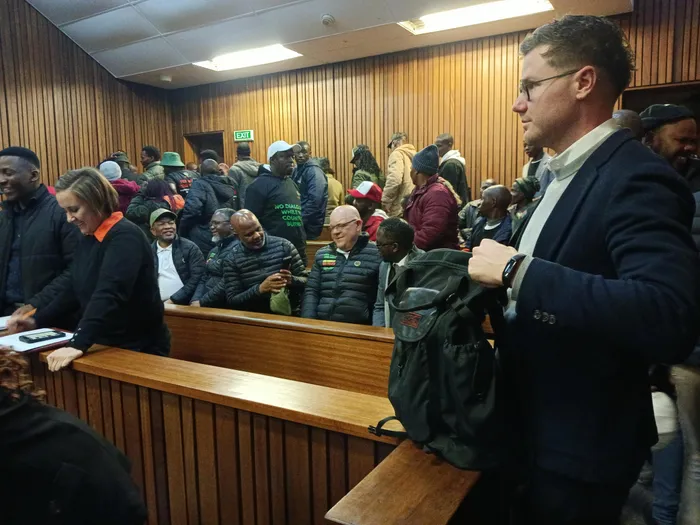Labour Party takes legal action against President Ramaphosa's National Dialogue

The Labour Party representatives packed the Pretoria High Court on Wednesday during its urgent application opposing next month's proposed National Dialogue.
Image: Zelda Venter
The Labour Party of South Africa turned to the Gauteng High Court, Pretoria, on Wednesday to urgently halt the President’s decision to convene a National Dialogue and two related conventions.
At the heart of its objections are the costs associated with this. It also said the National Dialogue is not a genuine democratic exercise, but a costly and dangerous duplication of the national legislature.
On June 10, President Cyril Ramaphosa announced what has been termed “the National Dialogue”, the first of which is scheduled for August 15 and is expected to set the agenda for the National Dialogue.
Advocate Margaretha Enbelbrecht SC argued that the National Dialogue Preparatory Committee estimates that the initiative will cost over R700 million, according to an announcement dated June 12.
This amount only covers the expenses of the National Convention on August 15, along with provincial and community engagements, as well as logistical costs such as venues, travel, and accommodation.
“In other words, significantly more than R700 million can be anticipated to be spent on implementing the decision to have a National Dialogue,” she said, pointing out that “there isn’t a budget, there isn’t a number or a cost that the government has committed to. All we have is what has been communicated as a proposal.”
According to the State respondents, a final budget will only be developed following engagements with the National Treasury and other potential partners.
Engelbrecht said pending the determination of a later review application, the Labour Party now seeks an urgent order interdicting and restraining the operation and implementation of the president’s decision to convene the National Dialogue process, including any expenditure related thereto.
“The Labour Party is asking this court to prevent expenditure on a project for which, it is common cause, no budget has been adopted yet and, more generally, to halt the furtherance of this project until its legitimacy under the Constitution has been adjudicated upon,” she argued.
The Deputy Director-General in the Office of the Deputy President, who issued an affidavit on behalf of the State respondents, opposed the application by stating that preparatory activities have historically begun before the final budget has been approved.
It was said on behalf of the government that the lack of a fully costed and approved budget does not prevent the government from starting planning and coordination. It was argued on behalf of the government that it would paralyse effective governance if every preparatory step required a finalised budget in advance.
The Deputy Director-General said that at the time of preparing their affidavit for the hearing, there had been no expenditure that had not been authorised.
But Engelbrecht said he provides no details of expenditure or authorisation. “Following ‘preparatory steps’, a final decision to have a National Dialogue, and to convene the first national convention (with all the costs attendant upon such a decision), cannot be taken if the costs are not known, and there is no budget for implementation of such a decision.”
Engelbrecht questioned where the money would come from. She argued that the absence of a budget calls for the process to be halted, so that South Africans are left with more than just an official’s assurance that there has not been, and will not be, irregular expenditure.
“There is no reason to rush into a questionable process. The idea of a National Dialogue has been discussed for some time. There is no urgent need for this to happen now,” Enbelbrecht said.
Judgment has, meanwhile, been reserved.
Related Topics: